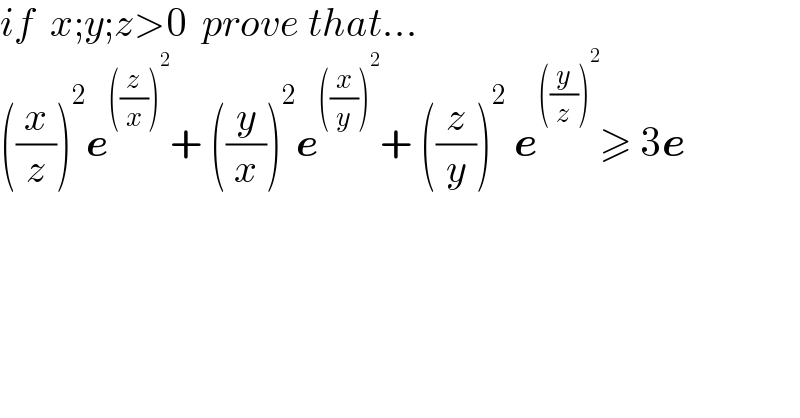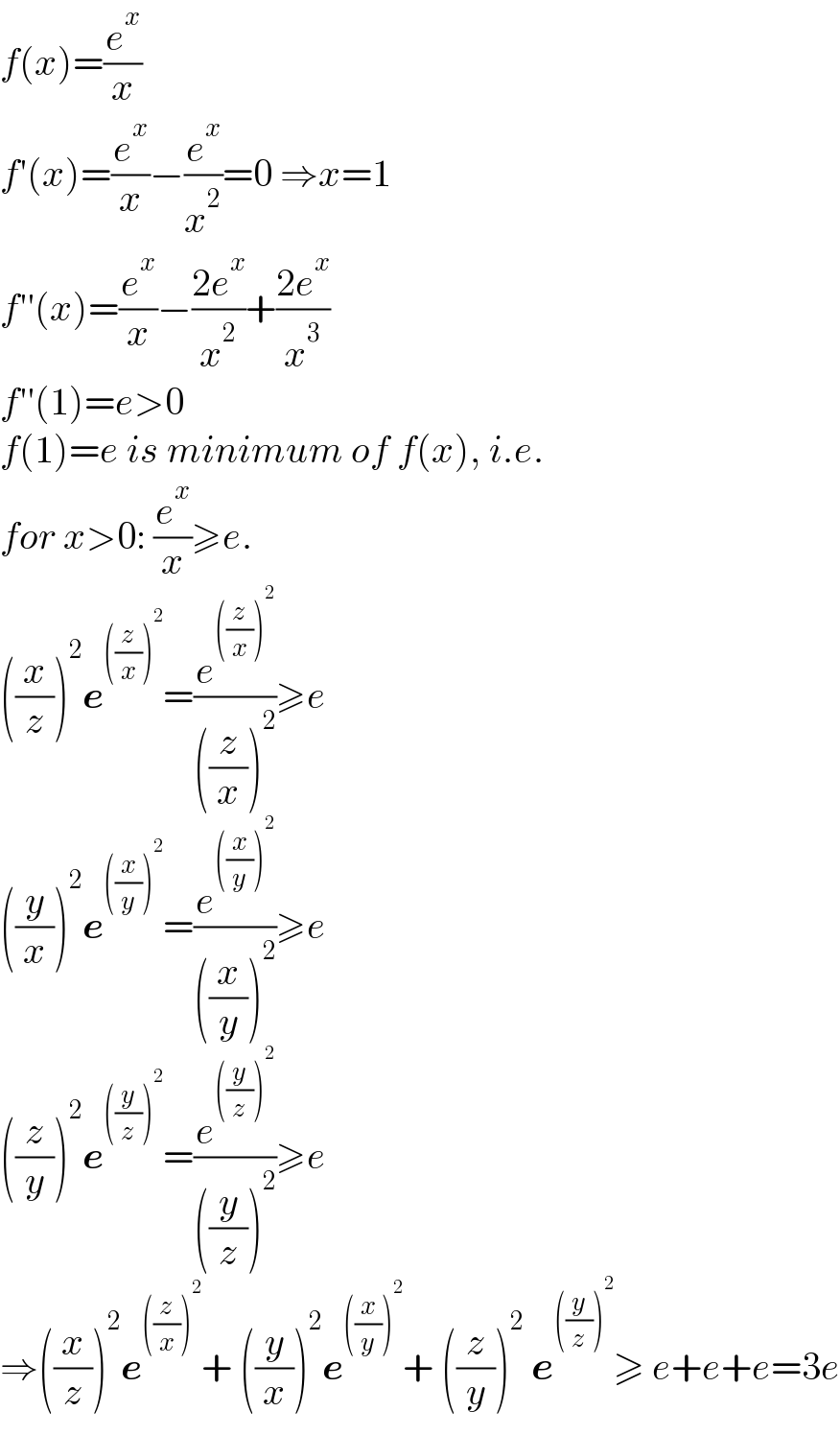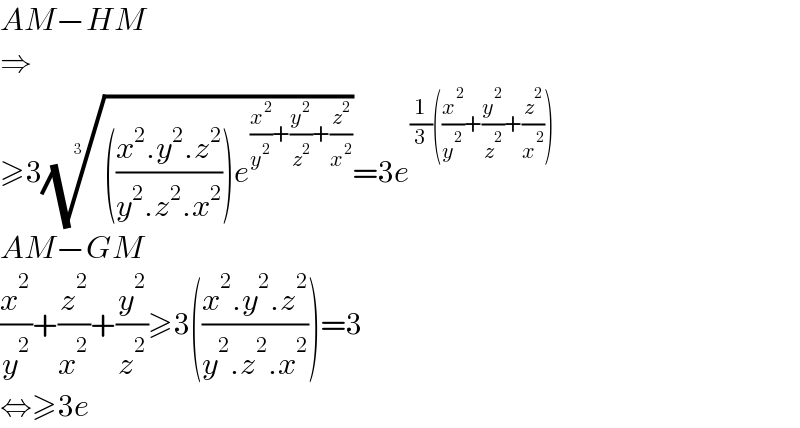Question Number 143410 by mathdanisur last updated on 14/Jun/21

$${if}\:\:{x};{y};{z}>\mathrm{0}\:\:{prove}\:{that}… \\ $$$$\left(\frac{{x}}{{z}}\right)^{\mathrm{2}} \boldsymbol{{e}}^{\left(\frac{{z}}{{x}}\right)^{\mathrm{2}} } +\:\left(\frac{{y}}{{x}}\right)^{\mathrm{2}} \boldsymbol{{e}}^{\left(\frac{{x}}{{y}}\right)^{\mathrm{2}} } +\:\left(\frac{{z}}{{y}}\right)^{\mathrm{2}} \:\boldsymbol{{e}}^{\left(\frac{{y}}{{z}}\right)^{\mathrm{2}} } \geqslant\:\mathrm{3}\boldsymbol{{e}} \\ $$
Commented by mr W last updated on 14/Jun/21

$${using} \\ $$$${f}\left({x}\right)=\frac{{e}^{{x}} }{{x}}\geqslant{e}\:{for}\:{x}>\mathrm{0} \\ $$
Commented by mathdanisur last updated on 14/Jun/21

$${Sir},\:{exactly}\:{how}\:{is}\:{the}\:{solution}\:{please} \\ $$
Commented by mr W last updated on 14/Jun/21

$${f}\left({x}\right)=\frac{{e}^{{x}} }{{x}} \\ $$$${f}'\left({x}\right)=\frac{{e}^{{x}} }{{x}}−\frac{{e}^{{x}} }{{x}^{\mathrm{2}} }=\mathrm{0}\:\Rightarrow{x}=\mathrm{1} \\ $$$${f}''\left({x}\right)=\frac{{e}^{{x}} }{{x}}−\frac{\mathrm{2}{e}^{{x}} }{{x}^{\mathrm{2}} }+\frac{\mathrm{2}{e}^{{x}} }{{x}^{\mathrm{3}} } \\ $$$${f}''\left(\mathrm{1}\right)={e}>\mathrm{0} \\ $$$${f}\left(\mathrm{1}\right)={e}\:{is}\:{minimum}\:{of}\:{f}\left({x}\right),\:{i}.{e}. \\ $$$${for}\:{x}>\mathrm{0}:\:\frac{{e}^{{x}} }{{x}}\geqslant{e}. \\ $$$$\left(\frac{{x}}{{z}}\right)^{\mathrm{2}} \boldsymbol{{e}}^{\left(\frac{{z}}{{x}}\right)^{\mathrm{2}} } =\frac{{e}^{\left(\frac{{z}}{{x}}\right)^{\mathrm{2}} } }{\left(\frac{{z}}{{x}}\right)^{\mathrm{2}} }\geqslant{e} \\ $$$$\left(\frac{{y}}{{x}}\right)^{\mathrm{2}} \boldsymbol{{e}}^{\left(\frac{{x}}{{y}}\right)^{\mathrm{2}} } =\frac{{e}^{\left(\frac{{x}}{{y}}\right)^{\mathrm{2}} } }{\left(\frac{{x}}{{y}}\right)^{\mathrm{2}} }\geqslant{e} \\ $$$$\left(\frac{{z}}{{y}}\right)^{\mathrm{2}} \boldsymbol{{e}}^{\left(\frac{{y}}{{z}}\right)^{\mathrm{2}} } =\frac{{e}^{\left(\frac{{y}}{{z}}\right)^{\mathrm{2}} } }{\left(\frac{{y}}{{z}}\right)^{\mathrm{2}} }\geqslant{e} \\ $$$$\Rightarrow\left(\frac{{x}}{{z}}\right)^{\mathrm{2}} \boldsymbol{{e}}^{\left(\frac{{z}}{{x}}\right)^{\mathrm{2}} } +\:\left(\frac{{y}}{{x}}\right)^{\mathrm{2}} \boldsymbol{{e}}^{\left(\frac{{x}}{{y}}\right)^{\mathrm{2}} } +\:\left(\frac{{z}}{{y}}\right)^{\mathrm{2}} \:\boldsymbol{{e}}^{\left(\frac{{y}}{{z}}\right)^{\mathrm{2}} } \geqslant\:{e}+{e}+{e}=\mathrm{3}{e} \\ $$
Commented by mathdanisur last updated on 14/Jun/21

$${cool}\:{Sir}\:{thank}\:{you} \\ $$
Answered by SEIJacob last updated on 14/Jun/21

$$ \\ $$$$ \\ $$
Answered by mindispower last updated on 14/Jun/21

$${AM}−{HM} \\ $$$$\Rightarrow \\ $$$$\geqslant\mathrm{3}\sqrt[{\mathrm{3}}]{\left(\frac{{x}^{\mathrm{2}} .{y}^{\mathrm{2}} .{z}^{\mathrm{2}} }{{y}^{\mathrm{2}} .{z}^{\mathrm{2}} .{x}^{\mathrm{2}} }\right){e}^{\frac{{x}^{\mathrm{2}} }{{y}^{\mathrm{2}} }+\frac{{y}^{\mathrm{2}} }{{z}^{\mathrm{2}} }+\frac{{z}^{\mathrm{2}} }{{x}^{\mathrm{2}} }} }=\mathrm{3}{e}^{\frac{\mathrm{1}}{\mathrm{3}}\left(\frac{{x}^{\mathrm{2}} }{{y}^{\mathrm{2}} }+\frac{{y}^{\mathrm{2}} }{{z}^{\mathrm{2}} }+\frac{{z}^{\mathrm{2}} }{{x}^{\mathrm{2}} }\right)} \\ $$$${AM}−{GM} \\ $$$$\frac{{x}^{\mathrm{2}} }{{y}^{\mathrm{2}} }+\frac{{z}^{\mathrm{2}} }{{x}^{\mathrm{2}} }+\frac{{y}^{\mathrm{2}} }{{z}^{\mathrm{2}} }\geqslant\mathrm{3}\left(\frac{{x}^{\mathrm{2}} .{y}^{\mathrm{2}} .{z}^{\mathrm{2}} }{{y}^{\mathrm{2}} .{z}^{\mathrm{2}} .{x}^{\mathrm{2}} }\right)=\mathrm{3} \\ $$$$\Leftrightarrow\geqslant\mathrm{3}{e} \\ $$
Commented by mathdanisur last updated on 14/Jun/21

$${thanks}\:{Sir}\:{cool} \\ $$
